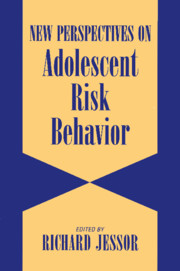Book contents
- Frontmatter
- Contents
- List of contributors
- Preface
- 1 New perspectives on adolescent risk behavior
- Part I A focus on development
- Part II A focus on problem behavior
- 3 Persistent themes and new perspectives on adolescent substance use: A lifespan perspective
- 4 Multiple risk factors for multiproblem boys: Co-occurrence of delinquency, substance use, attention deficit, conduct problems, physical aggression, covert behavior, depressed mood, and shy/withdrawn behavior
- 5 Adult outcomes of adolescent drug use: A comparison of process–oriented and incremental analyses
- 6 Linking etiology and treatment for adolescent substance abuse: Toward a better match
- 7 Risky driving behavior among adolescents
- Part III A focus on sexual activity
- Part IV A focus on psychopathology
- Part V A focus on social role performance
- Part VI Overview and integration
- Author index
- Subject index
5 - Adult outcomes of adolescent drug use: A comparison of process–oriented and incremental analyses
Published online by Cambridge University Press: 06 July 2010
- Frontmatter
- Contents
- List of contributors
- Preface
- 1 New perspectives on adolescent risk behavior
- Part I A focus on development
- Part II A focus on problem behavior
- 3 Persistent themes and new perspectives on adolescent substance use: A lifespan perspective
- 4 Multiple risk factors for multiproblem boys: Co-occurrence of delinquency, substance use, attention deficit, conduct problems, physical aggression, covert behavior, depressed mood, and shy/withdrawn behavior
- 5 Adult outcomes of adolescent drug use: A comparison of process–oriented and incremental analyses
- 6 Linking etiology and treatment for adolescent substance abuse: Toward a better match
- 7 Risky driving behavior among adolescents
- Part III A focus on sexual activity
- Part IV A focus on psychopathology
- Part V A focus on social role performance
- Part VI Overview and integration
- Author index
- Subject index
Summary
Introduction
Many longitudinal studies of drug use began in the 1970s with cohorts of adolescents (Kandel, 1980; White, 1996). Participants in these studies are now adults, allowing researchers to identify the impact of adolescent drug use on adult role functioning and health. Recent work in the area of adolescent substance use and its consequences has begun to focus on developmental processes and recognizes the need to examine long-term outcomes beyond adolescence. Since the emergence of a renewed interest in a lifespan developmental perspective in the 1960s, views of human development have evolved considerably. Earlier descriptions of change patterns as universal, invariant, irreversible, and unidirectional have lost ground to the recognition that there is wide variability in human development throughout the entire life course. This recognition has contributed to a growing interest in individual differences in the paths and trajectories of human development from childhood to adulthood (Campos, Hinden, & Gerhardt, 1995; Magnusson, 1996).
The need to be able to differentiate between the contemporary and cumulative impact of drug use on developmental outcomes has led to the implementation of longitudinal designs that cover extended time periods and incorporate more than two measurement occasions. How ever, the techniques for analyzing longitudinal data have lagged behind (see Chapter 2 in this volume), and one of the foremost issues confronting researchers today is how to best analyze change (e.g., Collins & Horn, 1991).
- Type
- Chapter
- Information
- New Perspectives on Adolescent Risk Behavior , pp. 149 - 180Publisher: Cambridge University PressPrint publication year: 1998
- 10
- Cited by



